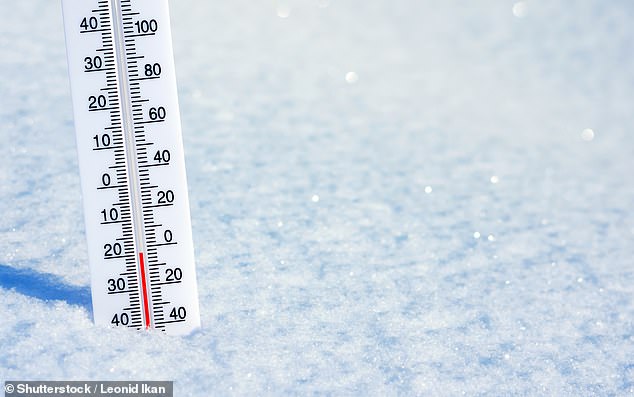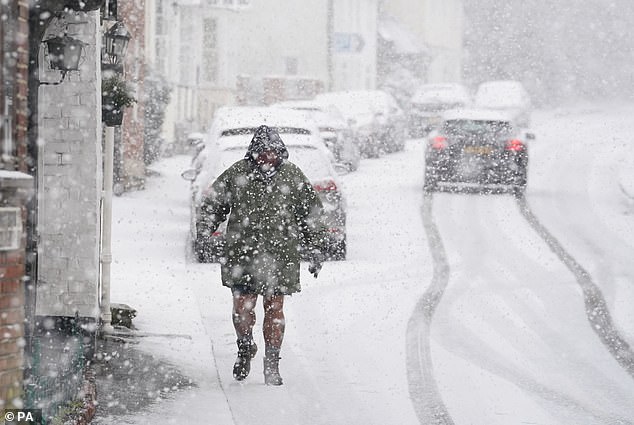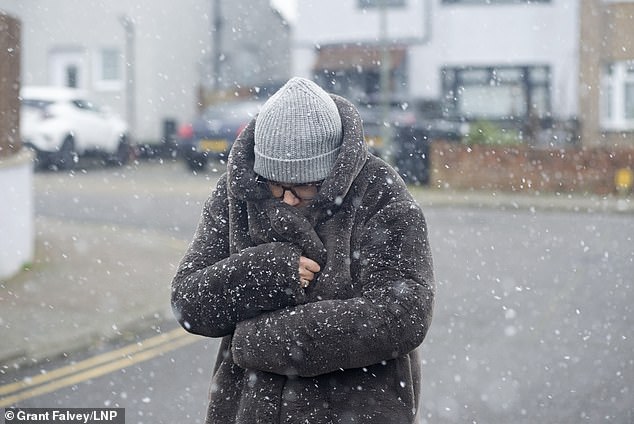Why you should turn your thermostat DOWN this winter: Experts reveal surprising benefits of cold weather – from boosting your metabolism to boosting feel-good hormones and rejuvenating skin
As a cold snap continues to grip the country, research suggests that embracing the cold can lead to a host of surprising health benefits, including boosting your metabolism and improving your mood.
With snow falling across Britain today and temperatures dropping to -7 degrees Celsius, experts claim a cold dip or run while the air is crisp – even if only for a short time – will do wonders for your health.
Decades of research have linked cold exposure, whether in the form of a bath, shower or outdoor exercise during the winter months, to a host of benefits.
From boosting metabolism to rejuvenating the skin, improving circulation and strengthening the heart, embracing the bitter cold has been found to naturally help the body achieve optimal health.
Researchers from Aston University in Birmingham claim that exercising outdoors in winter can bring many benefits, not only for your body, but also for your mind.

Experts insist that a cold dip or run when the air is crisp – even briefly – will do wonders for your health this winter (Photo: Shutterstock)


Snow fell in Britain today as temperatures dropped to -7C (19F), with more ice warnings and an amber health warning for the rest of this week (Picture: PA)


As a woman is caught in a snowfall on the street in Orpington, south-east London, this morning, experts claim a cold dip or run when the air is crisp – even if only for a short time – will do wonders for your health (Photo: Grant Falvey/LNP)
Here are the potential health benefits the cold snap can bring you:
Exercising in the cold can strengthen your heart and help fight the flu
Exercising in the cold not only helps you combat the symptoms of a cold or flu, but also reduces the chance that you will suffer from them.
Your immune system is forced to work harder against the lower temperatures and is better prepared to fight foreign invaders and their annoying symptoms.
Exercising in the cold can also strengthen your heart, as the vital organ has to work harder to pump blood around the body, keeping your heart in top shape.
Exercising in winter can boost your endorphins and have a positive effect on your mental health
Winter blues, or seasonal affective disorder (SAD), occurs because the days are shorter and your body/mind doesn't get enough light and endorphins.
Experts from Aston University claim that exercise has a particularly profound effect on mental health during winter, boosting important feel-good hormones and keeping the winter blues at bay.
In fact, research has shown that proper exercise can be up to four times more effective than taking antidepressants at improving symptoms of depression.
Being outside in the fresh air during cooler temperatures can not only be an effective mood enhancer, but also help replenish vitamin D levels, leaving your skin rejuvenated.


Exercising in the cold can not only combat the symptoms of a cold or flu, but also reduce the chance of getting one.


A person walking through a snowstorm in Lenham, Kent, this afternoon


Getting outside into the fresh air during lower temperatures and taking cold showers can replenish vitamin D levels and tighten pores, leaving your skin rejuvenated (Photo: Shutterstock)


Sleeping in a cold room helps your body release sufficient amounts of melatonin and prevents cortisol from rising and waking you up, aiding in much deeper sleep in winter (Photo: Shutterstock)
A cooler environment can help you sleep better
Sleeping in a cold room ensures that your body releases sufficient amounts of melatonin and prevents cortisol (stress hormone) from rising and waking you up, which helps with a much deeper sleep in winter.
The cooler temperatures in your bedroom will help you fall asleep faster by creating an environment that allows your body to release excess heat and support its natural circadian rhythm.
Cold water can be good for your skin
This applies to taking cold showers, as opposed to scalding hot showers in the winter, because hot water can strip your skin's natural oils and dry it out, while cold water helps constrict blood vessels to temporarily narrow pores and reduce redness to decrease.
Exercising in cold weather maximizes your calorie burn and can help you control your weight because your body works much harder to control core temperature.
As the body works to stay warm, your metabolism goes into overdrive and your body burns more calories and fat.
Cold water therapy can reduce muscle pain and stiffness
Embracing the frigid winter temperatures while out and about to improve your health is one thing, but what about submerging your entire body in ice-cold water?
According to Dr. Samantha Wild, Clinical Lead for Women's Health at Bupa GPCold water therapy has been reported to benefit the body in many ways, although the evidence is quite sparse and based on small studies or human experiences.
Some of the benefits said to come from cold water therapy include reducing muscle soreness and stiffness after exercise, by reducing swelling and inflammation.


Cars parked during a snowfall in Lenham, Kent, this afternoon


Exercising in cold weather maximizes your calorie burn and can help manage your weight because your body works much harder to keep core temperature regulated
The practice is also said to improve blood pressure and cholesterol levels, strengthen the immune system and improve general and mental well-being, and may also help with depression.
Meanwhile, experts from the University of Portsmouth have warned inexperienced persons to be careful when dipping in icy, open British waters it is not yet known whether there is a specific duration or temperature that works best.
They advise that 'less is definitely more' and that showering and bathing are a less dangerous option as you have more control over temperature and exposure time compared to open water.
